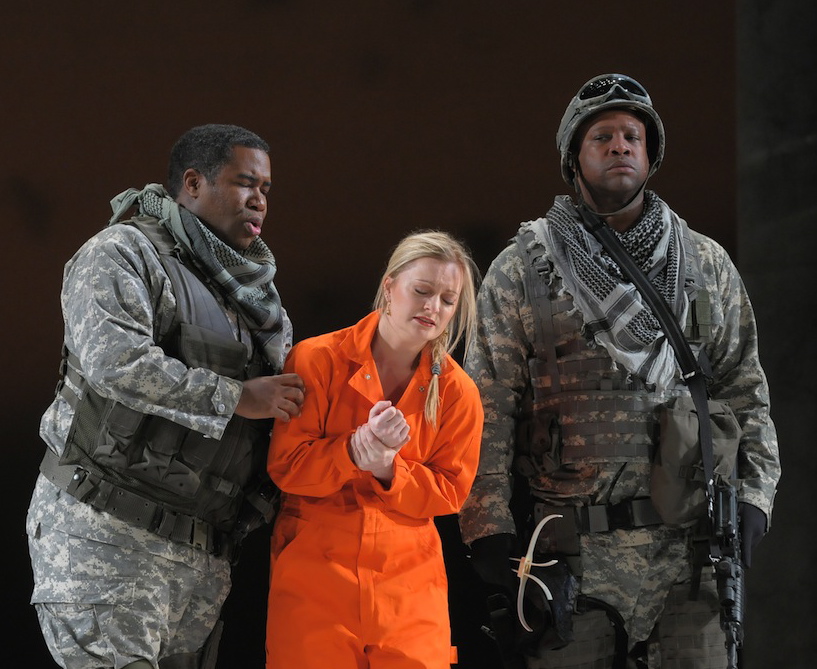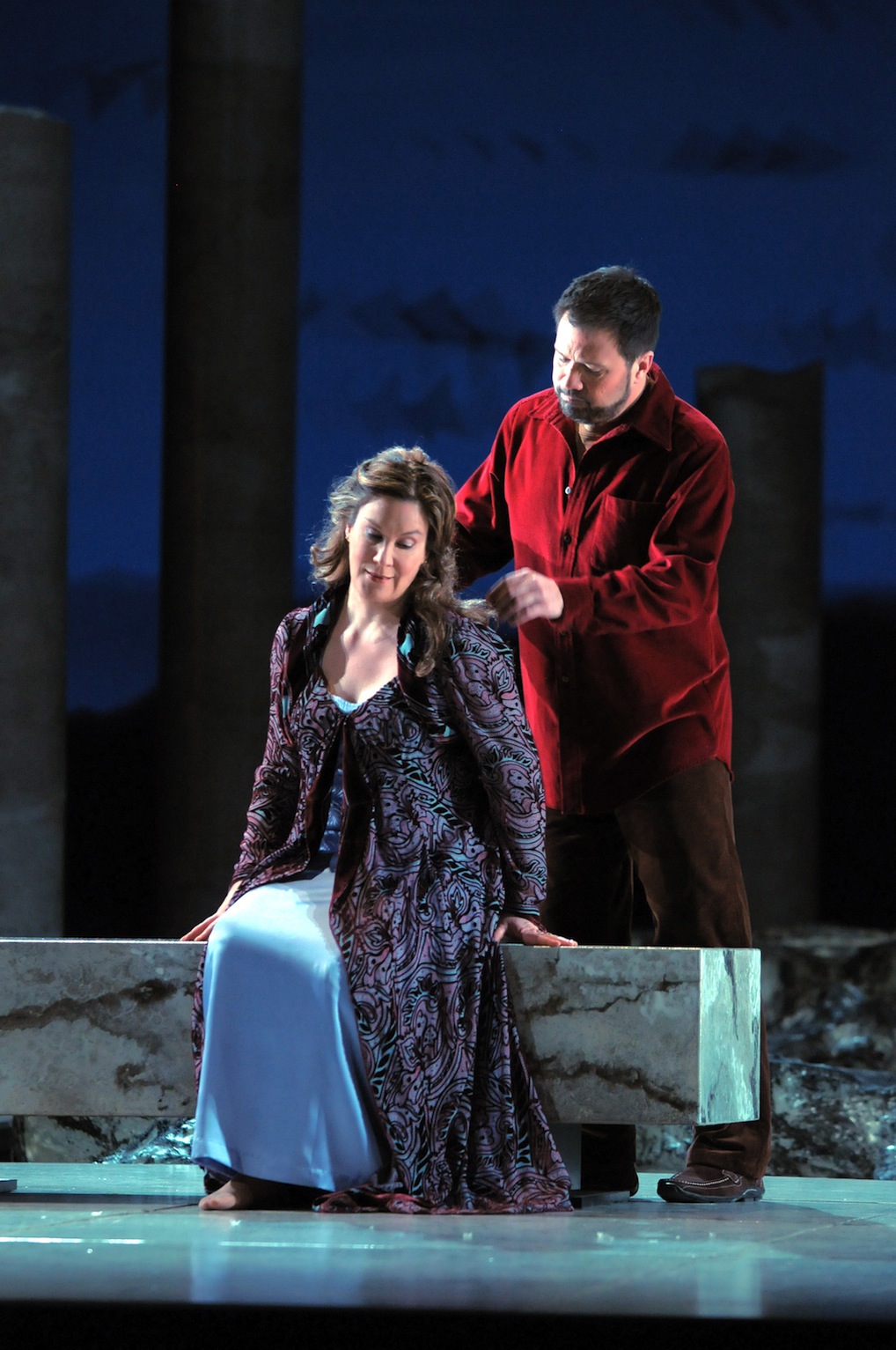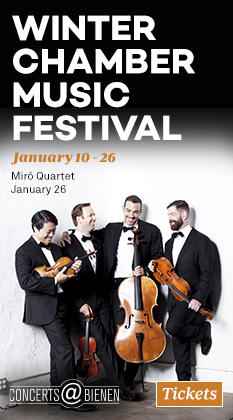A mighty cast makes up for directorial lapses in Lyric Opera’s American military take on “Hercules”

Those of us who agitate for opera companies to present more rarely heard works are in a tough spot with Hercules, the Lyric Opera’s final production of the season, which opened Friday night.
Handel’s 1745 “musical drama” is a difficult piece to pull off, even among the many intractable stage works in the composer’s canon. Long, structurally awkward and dramatically stilted, the oratorio/opera distributes the music evenly among four of the five characters, with the title role getting the fewest arias (and the least interesting).
Inspired by Sophocles’ The Women of Trachis, the scenario concerns the legendary hero Hercules who returns home to his family after years away fighting military campaigns. He has returned with a captive, Iole, the daughter of his deceased enemy, Oechalia.
Hercules sets Iole free, yet his jealous wife Dejanira is convinced that the general brought the princess back to work his romantic designs upon her. Furthering complicating matters, Hercules’ son Hyllus falls in love with Iole.
Dejanira plots to win Hercules back, yet her plan goes awry when the vest she applies a magic potion to instead winds up poisoning Hercules, causing him to die a painful and agonizing death.
All are despondent and Dejanira devastated by her involuntary murder of her husband. Yet soon the High Priest brings news that the deceased Hercules has entered Mount Olympus. Iole and Hyllas will wed, Dejanira is forgiven, and all celebrate Hercules’ legacy as a man of peace and freedom.
The slender scenario is scaffolding for a score that, if not one of Handel’s most memorable, offers plenty of worthy arias in the composer’s best florid and expressive styles.
With director Peter Sellars on board, you can expect an unusual staging twist in an opera that desperately needs some help. That Sellars has certainly provided, updating the action from ancient Thessaly to the 1990s and the first Gulf War.
Hercules is an American general in classic military fatigues, who returns home to Dejanira, here a manic-depressive suburban housewife.
The captive Iole makes her entrance in an orange prisoner jumpsuit and a black hood, from which she sings her first aria. If the jarring Abu Ghraib metaphor isn’t clear enough, the beefy G.I. guarding her (Marckarthur Johnson) violently pushes her to the ground, twice.
Yet Sellars’ revisionist staging doesn’t completely hold together. The role of the herald, Lichas, as friend of the family, is murky at best, and minor characters that don’t fit this contemporary retooling—the High Priest and First Trachinian—are simply excised.
Still, at least conceptually this Lyric Opera production was more successful in its quirky updating than one might think—surprisingly so, for one who has not been a Sellars admirer in the past.
The festive celebration that greets Hercules’ triumphant return is a barbeque patio party with the chorus of suburban neighbors and khaki-clad military vets hoisting beer bottles as they sing the general’s praises. And the final scene was most effective as Hercules’ body arrives in a coffin draped with an American flag and the soldiers pay their respects to Dejanira one by one. Considering the current extraordinary political events in the Middle East, Handel’s closing chorus could not be more strikingly resonant, extolling “liberty’s immortal song” and “the blessings that from peace and freedom flow,” ending the evening with an unexpected arsenal of democracy coda.
But, as is often the case with Sellars, even when his original concept is inspired, the working out of ideas is confused and basic blocking sometimes embarrassingly lame.
Sellars clearly believes Hercules is more guilty of infidelity—in desire if not in deed—than Sophocles or Handel. Judging by his rewritten plot in the program, the director sees the general as something of a burned-out battle-scarred head case with a drinking problem. Yet Sellars’ public comments on the production make it seem like this show is almost intended as an ode to America’s fighting men and women.
Whatever the original intent, he has clearly pulled back somewhat from overplaying a potentially controversial conception of Hercules as violent, unbalanced alcohol-abusing American veteran so as not to offend. The result is that Hercules’ fitful strange behavior—-picking up and swinging Iole around, encouraging pills on Dejanira, and swigging drunkenly from a bottle—is not really developed and just makes the character seem weird and muddled rather than damaged or emotionally complex. And Sellars’ retake on Dejanira as neglected pill-popping military wife just substitutes hoary new suburban soap-opera clichés for hoary old heroic Baroque clichés.
The least successful element is Sellars’ patented style of literal, over-directed stage movements. Does a singer always have to touch her chest, or someone else’s, every time “breast” is mentioned in the lyrics?
Even more distracting is Sellars’ inexplicable reliance on awkward physical gestures that draw attention to themselves and away from the singing and action—the chorus’s corny stylized unison arm movements, the soulful heavenly gazes, the acid-flashback stares at one’s palm, and, especially, Iole’s silly finger-wiggling on trilled passages. Enough already!
Hercules has taken some copious cuts in this production. The Lyric says 15-20% of the opera has been trimmed but I make it closer to a third of the music, and the three acts are here compressed into two parts with a single intermission. Still, even with some lovely arias excised, at almost three-and-a-half hours, I’m not sure even the most purist Handelian in the audience would want to hear much more of this work in one evening.
The good news is that from top to bottom, the Lyric has assembled a first-class cast of singers whose inspired vocalism allows one to overlook the less successful elements of Sellars’ staging.
As Iole, Lucy Crowe is the least-known member of the cast yet the English soprano wound up stealing the show in her company debut opening night. The singer threw herself into this difficult role with a bracing intensity and emotional commitment that made the production spring to life whenever she was on stage. She sailed fearlessly through the most elaborate coloratura passages with remarkable agility, pinpoint precision and expressive engagement—even from under a hood in her entrance aria, Daughter of gods, bright liberty!
The soprano brought a touching plaintive quality and gentle radiance to her forgiveness of the accusing Dejanira (My breast with tender pity swells) and Crowe’s spacious How blessed the maid ordained to dwell was the clear high point of the evening, sweetly sung with an emotional nostalgic ache that was riveting and intensely moving. This is a star-making debut and the English singer should receive a quick ticket back to Chicago for a return engagement. (Note: Baroque Band has scored a coup by booking Crowe and conductor Harry Bicket for its March Handel program; see baroqueband.org).
Even with her melancholy character emerging a bit undeveloped in this production, Alice Coote was a largely worthy Dejanira. If her coloratura wasn’t always as vital or incisive opening night as one would expect from Coote’s Baroque credentials, she rose to the big moments in style with a poignant and delicately shaded Where shall I fly?
Eric Owens had the, well, Herculean, task of making the title character seem both noble and somewhat unhinged. With the role’s limited vocal opportunities and stage time, he wasn’t always able to convincingly put across that duality, though he brought an unnerving intensity to Hercules’ death scene. Vocally, however, Owens was terrific, possessed of a classic sonorous Handel bass-baritone, and showing surprising agility for such a huge voice in the showy passages of Hercules’ boastful arias.
As the herald/family friend Lichas, David Daniels, unfortunately, lost several of his character’s arias but the popular countertenor made the most of his opportunities. His opening aria No longer, Fate, relentless frown was rendered with beautiful detailing and delicacy, and his expressive narration of Hercules’ demise and farewell aria, O scene of unexampled woe, was the stuff of truly great artistry.
As Hercules’ son Hyllus, Richard Croft was superb in his belated return to the company after his 1992 turn as Iago in Rossini’s Otello. The American tenor sang with firm projection throughout and also showed fine flexibility in the brilliant passages of his arias.
George Tsypin’s spare unit set with a few broken Roman columns is in the Lyric’s current standard of cost-effective minimalism, yet any visual monotony was avoided by some strikingly imaginative lighting effects by James F. Ingalls, particularly in the latter scenes.
Harry Bicket’s conducting was on the stately side, giving the singers plenty of room to phrase freely yet also dragging the tempos, though the English Baroque specialist picked up the pace after intermission.
The choruses in Hercules offer some of the opera’s finest music, but, sadly, a few of the best numbers were cut in this staging. Still, in his final assignment for Lyric Opera, Donald Nally elicited robust and vivid ensemble singing in those that remained. The chorus members were wonderfully characterful in their singing in various guises—notably in the “Jealousy” chorus—even while having to engage in Sellars’ semaphore Busby Berkeleyisms.
Hercules runs through March 21. lyricopera.org; 312-332-2244.
Posted in Performances


Posted Mar 20, 2011 at 2:01 am by Esther
I’m sorry to say that this production was embarrassingly ridiculous. Sellars’s concept had nothing to do with the piece, it was poorly executed, and it was incoherent on its own terms besides. Yes, Crowe was the star of the show. Otherwise, this was mostly a disappointment. Sellars’s notions, whatever their independent merits, didn’t make any sense in the proximity of Handel. As pointed out in the review, Sellars’s “Story of the Opera” is not the actual story of the opera (such as it is), but rather his own hackneyed invention that instead of resolving the difficulties of staging the piece, merely compounded them. He added a layer of “meaning” that was either the opposite of the obvious intended meaning or else, at least, an extremely awkward appendage. The sign language was cringe-inducing, like most of this production.